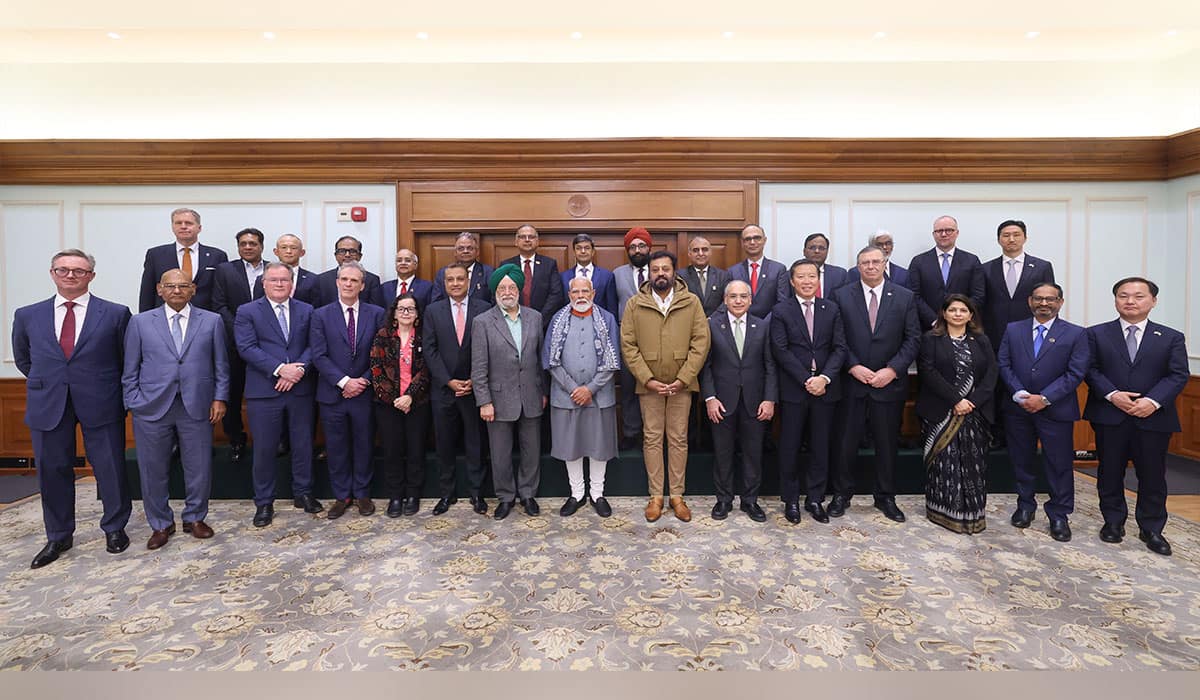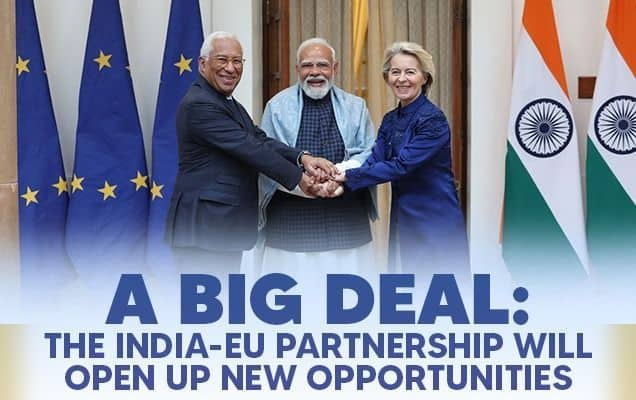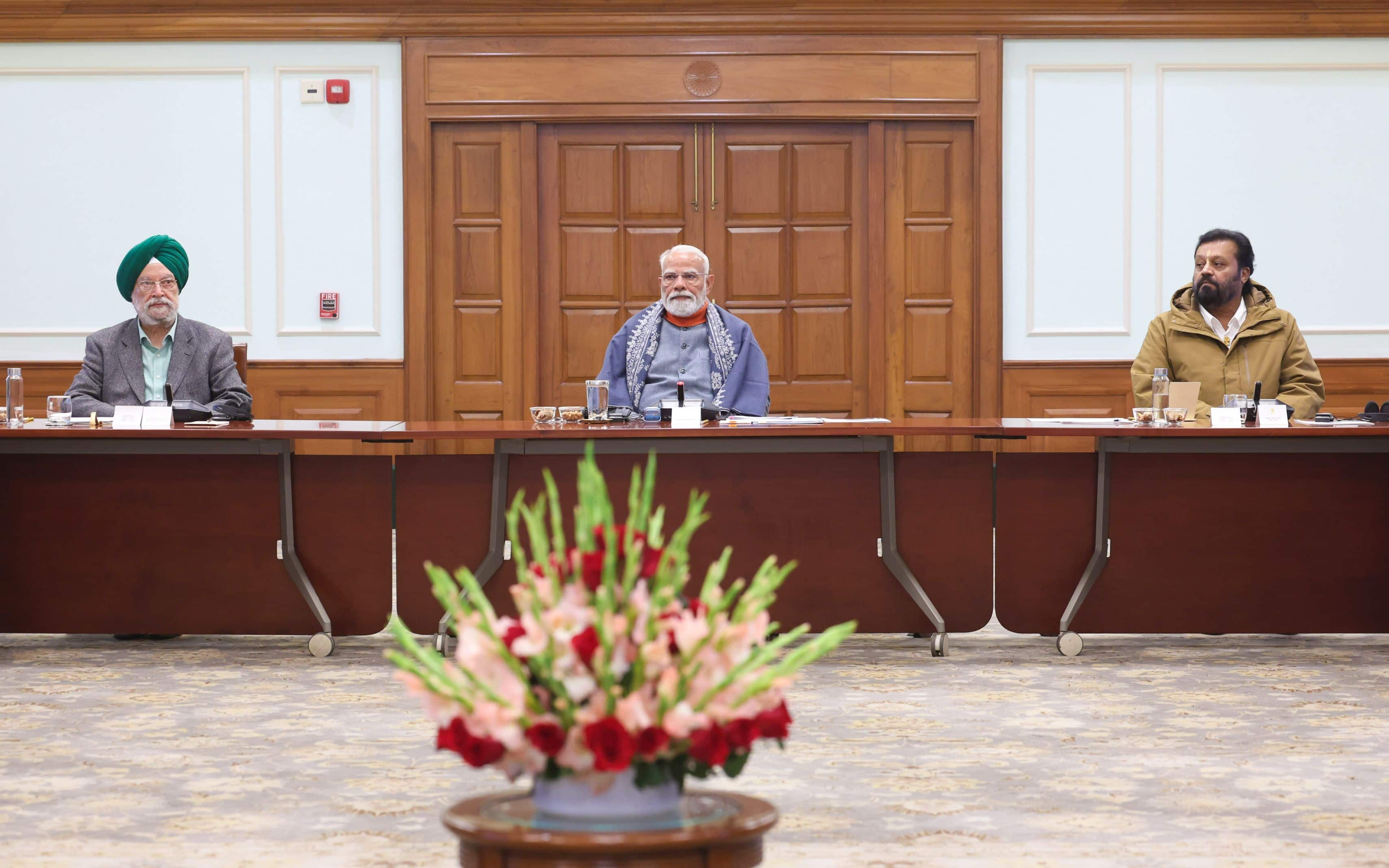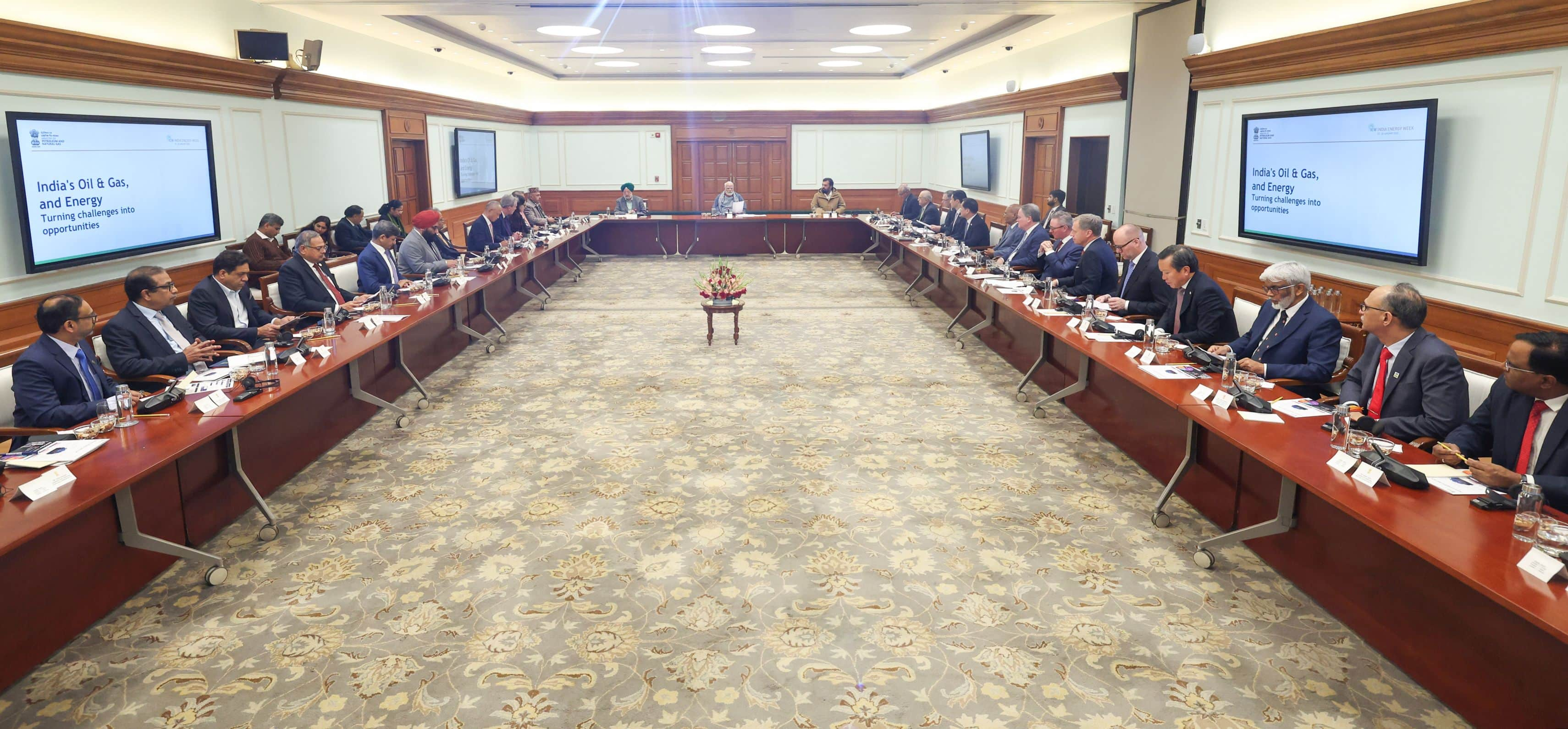Bharat Mata ki – Jai, Bharat Mata ki – Jai!
The popular and soft-spoken Chief Minister of Gujarat Shri Bhupendrabhai Patel, my senior colleague in Parliament and President of Gujarat Bharatiya Janata Party Shri C.R. Patil, Deputy Speaker of the Gujarat Legislative Assembly Shri Jethabhai, all ministers, MLAs of the Government of Gujarat, MPs, office bearers of Sabar Dairy and all the farmers and brothers and sisters associated with animal husbandry!
Today Sabar Dairy has expanded further. New projects worth crores of rupees are being set up here. With the addition of one more line to the Milk Powder Plant and A-Septic Packing Section, equipped with modern technology, the capacity of Sabar Dairy will increase further. The new plant, whose foundation has been laid today, will also help in increasing the capacity of Sabar Dairy. I congratulate Sabar Dairy and all the farmer brothers and sisters associated with this cooperative movement, the chairman and all the directors of the dairy, and convey my best wishes.
And when it comes to Sabar Dairy, it remains incomplete without remembering Bhurabhai. The initiative that Bhurabhai Patel started decades ago is helping transform the lives of millions today. Sabarkantha looks the same when one comes here, but something new seems to be happening every day. There is hardly any part of Sabarkantha which I have not visited. And everything becomes alive while visiting Sabarkantha. If one stands at the bus station, one gets to hear cries of Kher, Kher, Kher – Wadali, Wadali, Wadali, Kher-Wadali, Kher-Bhiloda. Whenever I visit Sabarkantha, this voice keeps reverberating in my ears. The memory of many of my friends comes alive whenever I come here. It is saddening that some of my friends have passed away. I miss Shriram Sankhla, Jayendra Singhbhai Rathod, S.M. Khant, Dhimant Patel, my brother Gajanand Prajapati, Vinod Khiljibhai. There were so many old friends, and even today, their faces are flashing in front of me. Be it Valjibhai, Praveen Singh Deora, or Rajabali of Modasa. Memories of many people and many family members haunt me as I had a very deep relationship with them. There have been very respectable names like Dayabhai Bhatt, Muljibhai Parmar and many such elders and friends. I worked with many of them. I would often meet Ramneekbhai whenever I got an opportunity to visit this place. I would meet many other families. But now all of you have entrusted me with such a responsibility that I only enjoy by remembering the old days.
Friends,
You are very well aware of the conditions which existed here two decades ago and I have also seen it. Nowadays, we are facing the problem of excessive rainfall in many parts of Gujarat. Rain for a Gujarati is such a great pleasure and satisfaction in itself, which the people outside the state can’t fathom. There is a famine for five and ten years here and people yearn for rain. Heavy rains make people emotional here. There is hardly any single crop possible during famine. There is also a problem for animal husbandry as getting fodder is a big challenge. We have seen the days when people would prefer sending their children to cities and reconcile to spending the rest of their life in villages. And at that time I resolved to change this situation with your cooperation and unwavering faith. And as irrigation facilities expanded in Gujarat, we made great progress in agriculture and animal husbandry and dairies proved to be a great force. Dairies gave stability to the economy, provided security and also created new opportunities for employment. While I was sitting with the sisters I enquired about their well-being. I asked them how they were doing and how much profit they were making. Then I asked them what they do with the profits. They told me that they buy gold with the profits. The first thing they do is to buy gold.
Friends,
Gujarat is one such state in the country where we issued health cards for animals many years ago and started animal health fairs. We even took care of cataracts and dental treatment of animals. As you are aware, 15 to 20 kgs of plastic waste used to come out of the stomachs of the cows during their operations at the animal health fairs. It would bring tears to people. Therefore, we have started a campaign to stop the use of plastics. Plastics are like an enemy to our animals. On the other hand, one should care about the animals so that they get good nourishment. Today my sisters have shared something with me which is very pleasing. It has got very little publicity. They told me that they cure the animals when they fall sick with Ayurvedic medicines. That is, our traditional primitive traditions for the cure of animals have been revived. I heartily congratulate the people of the dairy sector of Gujarat and Sabar Dairy that they have helped in the treatment of animals with the help of Ayurveda medicines.
When I took office in 2001 here, people would urge me to provide electricity during dinner time. There was no electricity in Gujarat in the evening. We started the campaign of Jyotigram Yojana. Today, boys and girls of 20-22 years will not even know what is called darkness. We launched the Jyotigram scheme in Gujarat. And the Jyotigram scheme not only brought light to the homes of Gujarat but TVs as well. This also played a key role in setting up the chilled milk units in villages and due to which the collection of milk increased and the spoilage of milk stopped. The milk was safe in the chilling centers till the vans brought fresh milk. As a result, the losses also started dwindling and it was possible due to electricity. The systems that have been developed in Gujarat in the last two decades are fetching better results today. Today the dairy market of Gujarat has reached Rs one lakh crore.
Friends,
When I returned to power in 2007 and also in 2011, I remember talking about processing plants with my friends in the dairy sector. I told them to increase the participation of women. Women in milk committees had little work before, but I am happy that today there are at least three women executives in those committees and in some places women have outnumbered men. We had made one rule in Gujarat then and I also enquired about it from the sisters whom I met today. At that time, I made a rule that whosoever comes to buy milk, he should give the money to women only and not to any man. The money will be better utilized if it goes into the hands of women. It will be for the betterment of family and welfare of animals. Today, only women get the payment of milk in Gujarat and, as a result, my women, sisters and mothers have also been empowered.
There is a rich tradition of cooperatives and culture in Gujarat. There is prosperity only because of cooperatives. We are expanding the success of the milk cooperative movement to other areas of farming as well. We are working rapidly to set up 10,000 Farmers Producers Organizations (FPOs). Small farmers will be able to directly connect with the food processing and value linked export and supply chains with the help of these FPOs. It will greatly benefit my farmer brothers and sisters of Gujarat.

Brothers and sisters,
The efforts made by the Central Government in the last eight years have led to an increase in the income of the farmers in different parts of the country, including Gujarat. Horticulture, animal husbandry and pisciculture have also increased the income of the farmers. And importantly, the landless farmers, who are the poorest, recorded the highest increase in their income. Similarly, the income of farmers with very small land has also increased. In a way, the strategy of working on alternative sources of income other than sowing crops is helping today.
Khadi and Village industries are also a good example of this. The turnover of Khadi and Village industries has crossed Rs 1 lakh crore for the first time. This is the reason that more than 1.5 crore new jobs have been created in the villages in this sector in the last eight years. Similarly, the production of honey in the last eight years as compared to 7-8 years before 2014 has increased. The people in Sabar Dairy told me that they were also preparing farmers for production of honey all over Sabarkantha by giving them boxes. The production of honey is going to almost double in such a short time. There is another advantage. If there is a bee in the field, it also acts as your companion like a farm worker. Bees are complementary to agriculture.
Moreover, today ethanol blending in petrol is more than 10 percent. How is this ethanol made? It is made from sugarcane and corn. Thus far, crude oil used to be imported from the Gulf. Now husk is being used to produce crude oil. It not only helps in our resources but the environment is also being protected. Until 2014, less than 40 crore liters of ethanol were blended in the country. Today it is around 400 crore liters. Our government has also given Kisan Credit Cards to more than 3 crore farmers by running a special campaign in the last two years. For the first time, farmers and fishermen have also been given Kisan Credit Cards.
Brothers and sisters,
We are constantly endeavoring to reduce the cost of farming with steps like Neem coated urea, restarting closed fertilizer factories and working on Nano fertilizers. Unlike fertilizer bags, Nano fertilizers come in a bottle and are equally useful. That is more profit with lesser efforts. Today work on Nano fertilizer is going on. In the last few months, the price of urea has increased manifold all over the world, but we did not let this burden the farmers of the country. Fertilizer has to be imported. Suddenly, the prices increased manifold. But this government of yours in Delhi did not let this burden fall on our farmers. The Government of India is bearing its burden today. A 50 kg bag of urea costs the government 3,500 rupees. How much? A bag costs 3,500 rupees. How much? 3,500 rupees! And how much does the government charge the farmers? Only 300 rupees! The bag costing 3,500 rupees should not burden my farmer brothers, and therefore, it is given to them at only 300 rupees in the entire country. Earlier the government used to bear the burden of Rs 500 on a 50 kg bag of DAP. Today, due to rising prices in the world, the government has to bear the burden of 2,500 rupees. But we do not let the farmers suffer this burden.
Friends,
The farmers of Gujarat are also getting the benefit of all these schemes. Over the years, the fields of more than 50,000 farmers of Arvalli have been connected with the micro irrigation facilities. And I especially want to congratulate the farmer brothers of Arvalli district in this regard. Today there are many villages of Arvalli where farmers are irrigating their land with 100% drip irrigation. Water has reached many such tehsils of Sabarkantha due to Sujalam-Sufalam scheme, where it could not even be imagined earlier. The completion of the Hathmati Canal's beautification project has enhanced the beauty of the entire area. Crores of rupees are also being spent under the Har Ghar Jal Abhiyan to meet the water needs of the cities.
Friends,
Today, Sabarkantha and its surrounding areas have an unprecedented connectivity infrastructure with the widening of railway lines, construction of railway bridges, widening of highways and increasing their length. The 150 km long four-lane Shamlaji-Modasa road connects directly with South Gujarat. This will connect Sabarkantha with South and Central Gujarat. As a result, the entire tribal belt, be it Khedbrahma, Meghraj, Malpur or Bhiloda, is rapidly getting connected with development. The work on the Himmatnagar to Khedbrahma broad gauge line is going on at a brisk pace. Brothers and sisters, you will recall that you used to think seven times if you had to go from Himmatnagar to Mehsana. It used to take hours, but now due to the construction of new roads, you reach there in three-and-a-half hours. You reach Himmatnagar, Mehsana and Vijapur quickly.
The four-lane road was made from Himmatnagar to Ambaji. All the people visiting Mother Amba from North Gujarat, South Gujarat or Central Gujarat take this route. That is, the people around these areas also continue to get their livelihood. And now the work of making the six-lane highway from Shamlaji to Ahmedabad is going on rapidly. Rs 1300 crore is being spent on this. You are aware that the medical college in Himmatnagar proved to be great help during the fight against Corona. We were very blessed.
Friends,
When connectivity and infrastructure becomes better, tourism benefits a lot and our young youth get employment. Sabarkantha and Banaskantha are places which are full of faiths, tribal tradition and natural environment. And I am fortunate that I was privileged to renovate the Shamlaji temple. Whoever goes there today would not know the condition of Shamlaji. And due to the development that is taking place in this region, the number of tourists is increasing along with opportunities for livelihood.
Brothers and sisters,
I have come to Sabarkantha at a time when the country is about to complete 75 years of independence and is celebrating the Amrit Mahotsav of independence. During this Amrit year of independence, the incident of Palchitaria tribal massacre is also completing 100 years. Under the leadership of tribal hero Motilal Tejawat ji, the tribal communities waged a war against the British. The people of Sabarkantha made the British shiver who massacred the tribals. But unfortunately, this incident was forgotten after independence. It was my good fortune to bring to the fore the sacrifices of the tribal community before the future generations. And that's why we succeeded in renovating the Palchitaria Martyrs' Memorial. Today Shaheed Smriti Van is showing the path of patriotism to the new generation with the inspiration of those immortal sacrifices.
It is also my privilege that I have also got an opportunity as the Prime Minister to get national recognition for the contribution of tribal society for independence. We have decided to celebrate the birth anniversary of Bhagwan Birsa Munda on 15th November as the Janjatiya Gaurav Diwas. Our government is also building special museums in the memory of tribal freedom fighters across the country.
Friends,
Another important coincidence has happened at this important stage of independence. For the first time, the country's daughter coming from tribal society has reached the highest constitutional post of India. The country has made Smt. Draupadi Murmu as its President. It is a moment of great pride for more than 130 crore Indians. The inclusive democracy, which was dreamt by our ancestors who sacrificed their lives for freedom, is being realized today.
Friends,
Today, I make a request to all the people of Gujarat and the countrymen from this holy land of Sabarkantha and our Chief Minister has also mentioned that the Har Ghar Tiranga campaign is being launched on the completion of 75 years of independence. In this campaign, every house in the country will hoist the tricolor from August 13. We have to take this virtuous resolve of ‘Ek Bharat, Shreshtha Bharat’ by hoisting this tricolor in Sabarkantha, Arvalli as well as in the whole of Gujarat and the entire country. Those who sacrificed for the freedom of the country will bless you by seeing the tricolor fluttering at your home.
Today, the honor and respect that Sabarkantha has given me and the blessings of my mothers and sisters in such a large number are my strength, energy and inspiration. With your blessings, may I continue with efforts for the welfare of the people with the values given to me by Gujarat! May the welfare efforts reach every village of India! Your blessing is my biggest asset. I am deeply grateful to you and congratulate the entire team of Sabar Dairy for their continuous expansion and growth drive. Thanks a lot. Raise both your hands and say loudly with me:
Bharat Mata ki – Jai!
Bharat Mata ki – Jai!
Bharat Mata ki – Jai!
Thank you!















